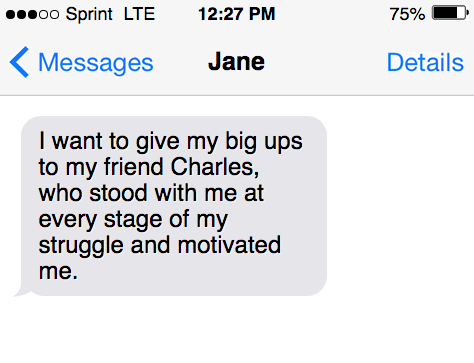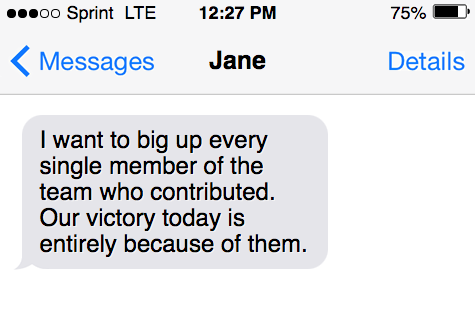Someone got “big ups” at work. What does “big ups” mean? And where did it originate? Is it an English expression referring to something positive or negative?
Learn more in this idiom guide…
What does the idiom “big ups” mean?
The phrase “big ups” is not a very common phrase or idiom in use. But surprisingly, it is not new either. The idiom has been in use since the previous century. But it is considered a bit dated nowadays, “big ups” is used as a noun. It means approval or acknowledgment of someone or their work. “He got a big ups from his boss” – in this sentence, “big ups” is a noun that refers to an appreciation or approval from the boss.

Use as a verb or noun
Big ups can also be used as a verb. In ‘I gave my big ups to my best friend who stood with me,’ – big ups is used as a verb in the meaning of ‘appreciating’ or ‘approving.’
Although it’s more common for it to get used as a noun, when it is used to describe a person, it refers to the person as being famous or an important person.
Big up and big ups are two usages of this phrase, both of which are used. When used as big up, it has another meaning too. It can mean increasing, becoming big, or exaggerating. ‘I want to big up on my muscles’ – in this sentence big up refers to increasing muscle mass. Similarly, ‘I want to big up by friend’ – here big up refers to promoting the friend by exaggerating or boosting them up.
Use in American culture
Big up and big ups have been used widely in popular culture. Actors and commentators have used it in different ways. For example, Jaime Pressley used big ups in the context of the show ‘Ugly Betty’. She said, “They are purposefully big upping the ugly girl…” This is an extended use of the phrase by adding –ing to it.
Of late, the use of big ups or big ups has reduced. Instead, the term ‘shout out’ is used more often. However, its use continued and is being used to mean support, encourage, remember, or respect.
Where did “big ups” originate?
The phrase big ups originated from the Caribbean, mainly from Jamaica. In that part of the world, big ups started to refer to an important person or highlight someone’s importance. According to the Merriam-Webster dictionary, the use of big up began as a verb and can be dated back to 1943.

As a noun, its use can be traced back to 1992. In fact, it was during the 1990s that its use became popular in the USA. Caribbean artists used his phrase frequently, especially in the hip-hop culture. That was when this phrase started to become popular.
Examples of big ups used in sentences
Big ups can be used in sentences like ‘big ups’ or ‘big up.’ The use of this phrase can be understood through the following examples:
- I want to give my big ups to my friend Charles, who stood with me at every stage of my struggle and motivated me.
- You know the singer Natalia? She is one of those who big ups her clothes and fashion accessories.
- The manager said, “Among all the salesmen, I like Clark the most. He always big ups products by going into details that others don’t do.”
- I want to big up every single member of the team who contributed. Our victory today is entirely because of them.
- The director had called. He has specifically mentioned that he wants to give big ups to Sharon for her dedication and commitment to meeting deadlines.
What does “big up” mean in Jamaican?
The phrase “big up” originated in Jamaica and other parts of the Caribbean. English speakers used it in those parts to boost someone or greet or acknowledge. The use was popularized in Jamaica by reggae musicians. During their performances, they would acknowledge the contributions of people who helped them.
They began to use “giving big ups to X” to acknowledge and respect someone’s contribution. Soon, this picked up and began to be used commonly. Later on, it spread to the US and even to the UK. A singer Tony Rebel even included lyrics in his song titled ‘Big Up Jamaica.’ Here, the meaning is to boost Jamaica or to acknowledge its importance.
What does “big ups” mean in slang?
“Big ups” is considered a common language in the Caribbean. In the US, it is considered slang. Its meaning of ‘increasing,’ ‘promoting,’ ‘acknowledge,’ and ‘recognize’ are also considered US slang.
In particular, the use of big up as increasing in size is considered slang. It refers explicitly to increasing muscle mass through exercise.
In some parts of the Caribbean, particularly in the Bahamas, the slang use of big up means pregnant. It can also be used to refer to impregnating someone.
Sources
- “Big-Up” on the Rise | OUPblog
- big up – Wiktionary
- Big-up Definition & Meaning – Merriam-Webster
- How to Use Big-ups Correctly – Grammarist
Inside this article
Fact checked:
Content is rigorously reviewed by a team of qualified and experienced fact checkers. Fact checkers review articles for factual accuracy, relevance, and timeliness. Learn more.
Core lessons
Glossary
- Abstract Noun
- Accusative Case
- Anecdote
- Antonym
- Active Sentence
- Adverb
- Adjective
- Allegory
- Alliteration
- Adjective Clause
- Adjective Phrase
- Ampersand
- Anastrophe
- Adverbial Clause
- Appositive Phrase
- Clause
- Compound Adjective
- Complex Sentence
- Compound Words
- Compound Predicate
- Common Noun
- Comparative Adjective
- Comparative and Superlative
- Compound Noun
- Compound Subject
- Compound Sentence
- Copular Verb
- Collective Noun
- Colloquialism
- Conciseness
- Consonance
- Conditional
- Concrete Noun
- Conjunction
- Conjugation
- Conditional Sentence
- Comma Splice
- Correlative Conjunction
- Coordinating Conjunction
- Coordinate Adjective
- Cumulative Adjective
- Dative Case
- Determiner
- Declarative Sentence
- Declarative Statement
- Direct Object Pronoun
- Direct Object
- Diction
- Diphthong
- Dangling Modifier
- Demonstrative Pronoun
- Demonstrative Adjective
- Direct Characterization
- Definite Article
- Doublespeak
- False Dilemma Fallacy
- Future Perfect Progressive
- Future Simple
- Future Perfect Continuous
- Future Perfect
- First Conditional
- Irregular Adjective
- Irregular Verb
- Imperative Sentence
- Indefinite Article
- Intransitive Verb
- Introductory Phrase
- Indefinite Pronoun
- Indirect Characterization
- Interrogative Sentence
- Intensive Pronoun
- Inanimate Object
- Indefinite Tense
- Infinitive Phrase
- Interjection
- Intensifier
- Infinitive
- Indicative Mood
- Participle
- Parallelism
- Prepositional Phrase
- Past Simple Tense
- Past Continuous Tense
- Past Perfect Tense
- Past Progressive Tense
- Present Simple Tense
- Present Perfect Tense
- Personal Pronoun
- Personification
- Persuasive Writing
- Parallel Structure
- Phrasal Verb
- Predicate Adjective
- Predicate Nominative
- Phonetic Language
- Plural Noun
- Punctuation
- Punctuation Marks
- Preposition
- Preposition of Place
- Parts of Speech
- Possessive Adjective
- Possessive Determiner
- Possessive Case
- Possessive Noun
- Proper Adjective
- Proper Noun
- Present Participle
- Prefix
- Predicate



